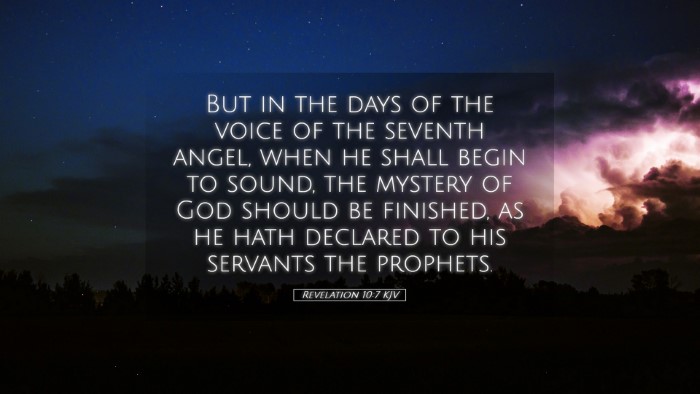Commentary on Revelation 10:7
Revelation 10:7 states: "But in the days of the voice of the seventh angel, when he shall begin to sound, the mystery of God should be finished, as he hath declared to his servants the prophets." This verse marks a significant transition in the book of Revelation, where the unfolding of divine mysteries reaches a climactic point. The commentaries of Matthew Henry, Albert Barnes, and Adam Clarke provide valuable insights into the layers of meaning encapsulated in this verse.
Contextual Background
Before delving into the specific verse, it is crucial to understand its context within the book of Revelation. The chapter depicts a mighty angel, whose presence signifies the authority and power of God, arriving with a solemn message. This angel's role is central in the unfolding of the final events in God’s prophetic timeline.
Understanding the Angel's Declaration
- Matthew Henry: Henry emphasizes the importance of the seventh angel and the significance of the number seven in biblical literature as a symbol of completion. The sounding of the seventh trumpet heralds the final stages of God’s judgment and the fulfillment of His divine plan. This marks not only the conclusion of divine mysteries but also the culmination of all prophetic declarations made by the prophets.
- Albert Barnes: Barnes highlights the notion of the "mystery of God" as encompassing God’s overarching plan for humanity—specifically, the establishment of His kingdom and the restoration of creation. He notes that this mystery involves elements that have been previously hidden but are now revealed through apocalyptic prophecy, stressing God's ultimate sovereignty and control over history.
- Adam Clarke: Clarke elaborates on the concept of 'mystery,' using Scriptural references to enhance understanding. He relates it to the notion of God's previously hidden intents and plans being made known at the end times. Clarke underscores the notion that such revelations are not merely theoretical but deeply practical, affecting how believers live in anticipation of Christ’s return.
Theological Implications
This verse holds significant theological weight, inviting reflection on the nature of God’s revelation and the fulfillment of His promises:
- The Sovereignty of God: Each commentator agrees that the unfolding of God’s mysteries illustrates His ultimate authority over history. Matthew Henry points out that every event, culminating in the sounding of the trumpet, reflects the divine timeline orchestrated by God.
- Hope and Expectation: The promise of the “mystery of God” being finished brings hope to believers. Barnes emphasizes that the culmination of these mysteries should encourage Christians to remain steadfast in faith, as God’s promises are sure to be fulfilled.
- Responsibility of Proclamation: Alluding to the prophets, this verse highlights the role of prophetic voices in the ongoing dispensation of God’s Word. Clarke stresses that believers have a responsibility to continue declaring God’s truth in light of the unfolding mystery, underscoring the continuity of God’s message through time.
The Role of Prophets
The mention of “servants the prophets” invites a consideration of the role of prophets in both the Old and New Testaments. The prophets not only foretold future events but also served as God’s agents in calling the people back to faithfulness:
- Matthew Henry: He notes that the correlation between God’s mysteries and the prophets emphasizes that revelation is progressive. Over time, God has delivered His messages through various prophets, each contributing to the ultimate revelation found in Christ.
- Albert Barnes: Barnes also points to the historical context in which prophets operated, suggesting that their messages were often met with resistance. However, they faithfully declared God’s truths, ensuring that His plan would be unveiled.
- Adam Clarke: Clarke reiterates that the prophets’ role continues to be vital, expressing the concept that the prophetic voice is not limited to ancient times but is ongoing through believers today.
Culmination of God’s Kingdom
As the verse portrays the end of the mystery, it points toward the completion of God’s redemptive plan:
- Matthew Henry: He posits that the end of the mystery represents a time when God’s kingdom is fully realized, demonstrating justice, peace, and the reign of Christ.
- Albert Barnes: Barnes supports this with the view that the completion of God’s mystery correlates with the final judgment, where Christ’s sovereignty is established in totality. This accentuates the promise that evil will ultimately be vanquished.
- Adam Clarke: Clarke encourages believers to live with an awareness of this impending fulfillment. The hope embodied in this culmination completes the narrative of redemption and restoration.
Conclusion
Revelation 10:7 stands as a bastion of hope and anticipation for believers. It encapsulates the ultimate victory of God over chaos and sin, affirming the culmination of His divine mystery and purpose. Through the insights of Matthew Henry, Albert Barnes, and Adam Clarke, we understand the vital significance of this verse not only in its historical and theological context but also in its implications for contemporary faith practice. As the church anticipates the second coming of Christ, the call remains: to faithfully proclaim the mysteries of God while living in eager expectation of His ultimate revelation.


